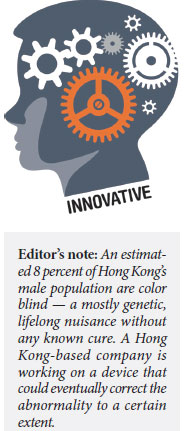The color in your eyes
Updated: 2015-05-07 07:48
By Deng Yanzi in Hong Kong(HK Edition)
|
|||||||

Not all are fortunate enough to live life, literally, in full color.
Statistics show that one in every 12 men suffers from some sort of color deficiency, which deprives him of a certain range of color in his vision and, in extreme cases, leaves him in a world of black and white.
A pair of color rectification glasses, offered by a Hong Kong-based company, Optica Technology, seeks to lift them out of the frequent inconvenience, or even danger, posed by color blindness.
Working on an image enhancing software developed by Optica, this optical device would alter the color to a distinguishable level for users. To some extent, the glasses add a filter to the world in the eyes of the color blind.
The device is still being developed and is scheduled to be completed by May.
Brimming with confidence in the technology, Jeremy Lai Chun-kei, co-founder and head of business development of Optica, finds it challenging to gain wide acceptance in the market, as he believes the era of wearables is yet to come.
In the mean time, Optica will also apply the software solution further on all panel displays, which can benefit a broader scale of patients when they look at a computer, smartphone, television and other devices with a screen.
The idea to serve the color-blind group grew on the solid foundation of co-founder and technology head Samuel Shen Wuyao's academic background.
Currently a PhD student at the Chinese University of Hong Kong, 27-year-old Shen has access to abundant academic results on vision studies, and believes that the rich knowledge should make its presence felt and be beneficial to people in their daily lives.
Shen later came to know that the city's color-blind population is bigger than people may think, and decided to apply his expertise.
Without any known cure, color vision deficiency - a genetic condition in most cases - is a lifelong nuisance for about 8 percent of Hong Kong's male population.
For a technology that can relieve this condition to some extent, the challenge would be to meet the needs of patients with different levels and types of color blindness, said Allen Cheong Ming-Yan, assistant professor in optometry at Hong Kong Polytechnic University.
"I expect this type of technology to offer more instructions to users, and I hope they'll run tests and gather enough data to learn more about their users," she suggests.
The technology was initially a mobile application developed by Isaac Mai Shubin - Shen's lab partner - when they both studied at the South China University of Technology. They decided to team up for their shared interest in color blindness last year.
With a business and investment background, Lai, 29, crossed path with Optica accidentally, in a program to visit the Silicon Valley. At that time, Shen struck Lai as forthright, even a bit abrupt.
"He cut into my conversation with other people all of a sudden and voiced his intention to find a partner," Lai recalls.
When talking about how he eventually became a co-founder of the company, Lai jokes that he was already in before he realized it.
"I later got a call from Samuel to meet up. At the meeting, he showed me a pair of glasses, and I tried them on. Before I could make any comment, Samuel started talking: 'Everyone sitting in this room is part of the company.' I was genuinely shocked," Lai said, adding he still couldn't help giggling at his partner's awkwardness half a year ago.
Lai, who is also a full-time headhunter and presumably a good judge of character, says he sees Shen's talent and humility behind his no-nonsense, geeky mannerism.
Team dynamics is vital for a startup, Lai says, adding that the Optica team has good dynamics as the personalities and skill sets of the members complement each other.
Optica is currently working on the blueprint program, an accelerator run by Swire Properties Ltd, where Lai hopes this young team can be advised, trained and thus grow.
With the aim of using technology to "optimize the power of the human eye", the company applies the image enhancing technology not only on color blindness rectification, but also on the optimization of drone videos, as well as film production, in which they provide a software solution to produce a 3D image with more vivid colors and life-like effects.
Optica knocked on a few doors of local production companies to pitch their technology, only to learn that Hong Kong's film production doesn't have a 3D focus, and the big chance to commercialize their 3D technology is abroad in Hollywood.
To find their way into the industry, Lai and Shen once plotted to ambush James Cameron, the world-renowned film director of Titanic and Avatar, outside his hotel when he visited Hong Kong last year, to pitch their business.
The attempt to ambush the film director, which failed eventually, is one of Lai's favorite anecdotes to tell, but the plot may not be uncommon to startups striving for a chance in their respective fields.
"The ecosystem of the show business is very complex, especially in Hong Kong. It's extremely hard for a startup without many contacts in the industry," says Lai.
iris@chinadailyhk.com

|
Billy Wong / China Daily |
(HK Edition 05/07/2015 page9)
